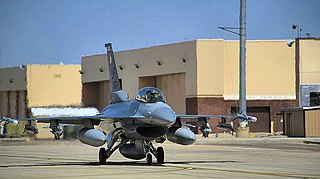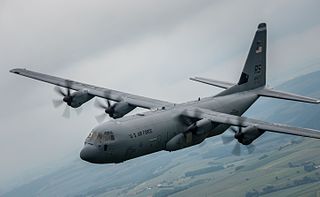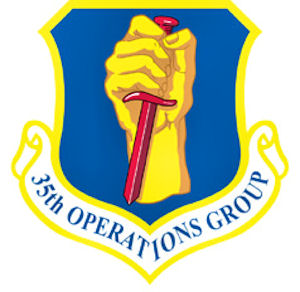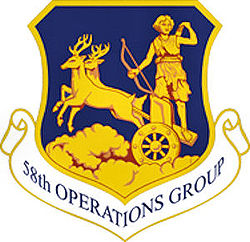
Luke Air Force Base is a United States Air Force base in Maricopa County, Arizona, United States. It is located 7 miles west of the central business district of Glendale, and 15 miles west of Phoenix.

The 58th Special Operations Wing is a combat unit of the United States Air Force stationed at Kirtland Air Force Base, New Mexico. The 58 SOW is part of the Air Education and Training Command (AETC) Nineteenth Air Force.

The 315th Airlift Wing is a wing of the United States Air Force Reserve. It is stationed at Joint Base Charleston, in the city of North Charleston, South Carolina, and operates the C-17 Globemaster III aircraft. If mobilized, the unit would fall under control of Air Mobility Command.

The 69th Fighter Squadron is a United States Air Force Reserve fighter squadron. It is assigned to the 944th Operations Group, stationed at Luke Air Force Base, Arizona.

The 309th Fighter Squadron is part of the 56th Operations Group at Luke Air Force Base, Arizona. It operates the General Dynamics F-16 Fighting Falcon aircraft conducting advanced fighter training.

The 310th Fighter Squadron is part of the 56th Operations Group at Luke Air Force Base, Arizona. It operates the Lockheed Martin F-35A Lightning II, conducting advanced fighter training.

The 311th Fighter Squadron (Sidewinders) is part of the 54th Fighter Group at Holloman Air Force Base, New Mexico which is a geographically separated unit under the 56th Fighter Wing at Luke Air Force Base, Arizona. It operates the General Dynamics F-16 Fighting Falcon aircraft conducting advanced fighter training. The squadron previously operated the Fighting Falcon conducting advanced fighter training at Luke and was inactivated due to budget constraints after the end of the Cold War. It was recently reactivated at Holloman and the aircraft were received from the 309th Fighter Squadron.

The 418th Test and Evaluation Squadron is an active United States Air Force unit assigned to the 53rd Test and Evaluation Group, and stationed at Davis-Monthan Air Force Base, Arizona, where it was activated on 1 October 2021.

The 39th Flying Training Squadron is part of the 340th Flying Training Group and is the reserve associate to the 12th Flying Training Wing based at Randolph Air Force Base, Texas.

The 550th Fighter Squadron is an active United States Air Force unit. Its current assignment is with 56th Operations Group, at Kingsley Field, Oregon.

The 71st Operations Group is the operational flying component of the United States Air Force 71st Flying Training Wing. It is stationed at Vance Air Force Base, Oklahoma.

The 526th Fighter Squadron is an inactive United States Air Force unit. Its last assignment was with the 86th Operations Group, based at Ramstein Air Base, Germany. It was inactivated on 1 July 1994.

The 86th Operations Group is the flying operational component of the 86th Airlift Wing, United States Air Force. The group is stationed at Ramstein Air Base, Germany.

The 31st Operations Group is the flying component of the 31st Fighter Wing, assigned to the United States Air Forces in Europe. It is stationed at Aviano Air Base, Italy.

The 401st Air Expeditionary Group is a provisional United States Air Force unit assigned to United States Air Forces in Europe to be activated or inactivated at any time as needed. It is stationed at Ramstein Air Base, Germany.

The 48th Operations Group is the flying component of the 48th Fighter Wing, assigned to the United States Air Forces in Europe – Air Forces Africa. The group is stationed at RAF Lakenheath, England.

The 36th Operations Group is the operational component of the 36th Wing, assigned to the United States Air Force Pacific Air Forces. The group is stationed at Andersen Air Force Base, Guam.

The 18th Operations Group is the operational flying component of the United States Air Force 18th Wing, stationed at Kadena Air Base, Okinawa, Japan.

The 35th Operations Group is the operational flying component of the United States Air Force 35th Fighter Wing. It is stationed at Misawa Air Base, Japan, and is a part of Pacific Air Forces (PACAF).

The 323d Expeditionary Operations Group is a provisional United States Air Force unit assigned to the United States Air Forces in Europe. As a provisional unit, it may be activated or inactivated at any time.




























